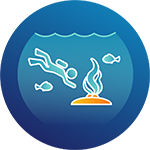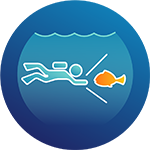
Marine Mammal Science
The Care and Conservation of Marine Mammals
Marine mammal science is a diverse field that includes the study of animal behavior, communication, evolution, physiology, ecology, and zoology. Marine mammal scientists (also called marine mammalogists) study the genetics, evolutionary relationships, population structure, community dynamics, anatomy and physiology, behavior and sensory abilities, parasites and disease, geographic distributions, ecological interactions, and management and/or conservation of marine mammal species. Like zoologists, many work to increase the knowledge and understanding of wildlife species. They often conduct field research to learn about the behavior and interactions of marine mammals in their natural environment.[1]
Types of Marine Mammals
There are about 100 species of aquatic or marine mammals that depend on freshwater or the ocean for part or all of their life. Marine mammals are found in marine ecosystems around the globe. They are a diverse group of mammals with unique physical adaptations that allow them to thrive in the marine environment with extreme temperatures, depths, pressure, and darkness. Marine mammals are classified into the following four different taxonomic groups.[2]
Cetaceans
Marine mammals in the cetacean family include whales, dolphins, and porpoises. These animals are completely aquatic, meaning they spend all of their time in the ocean and cannot survive on land.[3]
Pinnipeds
Pinnipeds include seals, sea lions, and walrus and are carnivores that have adapted to an amphibious marine existence. They forage at sea, but most come ashore or onto ice at some time of the year to mate, give birth, suckle their young, or molt. Many of their anatomical features reflect the compromises needed to succeed in both marine and terrestrial environments.[4]
Sirenians
Sirenians include any of the four large aquatic mammalian species now living primarily in tropical waters where food plants grow. The three species of manatee occupy warm latitudes of the coastal Atlantic and associated rivers, and the dugong inhabits the coastlines of the Indian and Pacific oceans.[5]
Marine Fissipeds
Sea otters and polar bears are marine fissipeds. Marine fissipeds are “split-footed” members of the order Carnivora, and are more closely related to terrestrial carnivores, like weasels, than seals or whales. Evolutionary newcomers to the marine environment, these species lack many of the physiologic adaptations to marine life seen in pinnipeds and cetaceans. Both species are considered marine mammals under U.S. laws because of the roles they play in the marine environment.[6]
Marine Mammal Training
Often known as animal trainers, animal care specialists, keepers, or mammalogists; marine mammal trainers are all hands-on marine mammal professionals. Marine mammal training is a conditioning process through which animals receive mental stimulation, physical exercise, and husbandry care. Animal trainers are responsible for the total mental and physical health of the animals in their care. This includes pool maintenance, water quality, and diet preparation.[7] A marine mammal trainer works daily with large marine mammal species such as dolphins, sea lions, seals, and manatees – most often in zoo or aquarium settings. Marine mammal trainers are responsible for the welfare, both mentally and physically, of their animals. In working with animals such as dolphins, manatees, and sea lions, it is important that trainers have a solid understanding of anatomy, physiology, animal behavior, nutrition, chemistry, and marine biology. Since the knowledge base for marine mammal trainers is broad and encompasses many fields of study, it is recommended that prospective trainers have a background in a scientific field such as animal science, zoology, biology, marine biology, or chemistry; although there are endless degree possibilities that would provide the necessary education.[8]
Marine Mammal Conservation
As some of the top predators of the oceans, marine mammals play an important role in the food web and help ensure balance in the ocean’s ecosystem. Marine mammals face an array of threats from human activities, including bycatch in fishing gear, collision with vessels, depletion of prey resources, climate change, hunting, pollution, disease, and habitat degradation and loss. For these reasons, marine mammals present an array of issues and challenges for conservation and management.[9]
Marine Mammal Protection Act
All marine mammals are protected under the Marine Mammal Protection Act (MMPA). The MMPA makes it illegal to harass, feed, hunt, capture, or kill any marine mammal. The MMPA was passed in 1972 to maintain the health and stability of the marine ecosystem. Marine mammals were in danger of diminishing, some to the point of extinction, as a result of human activities like hunting and fishing. The MMPA protects all marine mammals, including cetaceans (whales, dolphins, and porpoises), pinnipeds (seals and sea lions), sirenians (manatees and dugongs), sea otters and polar bears within the waters of the United States. The MMPA makes it illegal to “take” marine mammals without a permit. This means people may not harass, feed, hunt, capture, or kill any marine mammal. It also established the Marine Mammal Commission and formalized the marine mammal health and stranding response program to improve responses to strandings and unusual mortality events.[10]
The MMPA was amended in 1994 to require the National Oceanic and Atmospheric Administration (NOAA) to use science-based research to assess marine mammal populations. These reports help estimate deaths due to human activity, recover depleted populations, and increase our understanding of marine mammal biology and ecology. The MMPA is managed by the federal government. The National Marine Fisheries Service, part of NOAA within the Department of Commerce, is responsible for managing cetaceans, otariids (eared seals or sea lions), and phocids (true seals). The U.S. Fish and Wildlife Service, part of the Department of the Interior, is responsible for managing odobenids (walruses), sirenians, sea otters, and polar bears. The Animal and Plant Health Inspection Service, part of the Department of Agriculture (USDA), is responsible for regulations managing the facilities that house marine mammals in captivity.[11]
…
Citations
- Marine Mammologist, Discovery of Sounds in the Sea.
- Marine mammals, National Oceanic and Atmospheric Administration.
- Learn More About Cetaceans, Marine Mammal Center.
- Seals, Sea Lions, and Walrus: Pinnipeds, Sea Grant Alaska.
- Sirenian, Encyclopaedia Britannica.
- Sea Otters and Polar Bears: Marine Fissipeds, Sea Grant Alaska.
- How To Become A Trainer: Careers With Marine Mammals, International Marine Animal Trainers Association.
- Marine Mammal Training and Research, NC State University.
- International Marine Mammal Conservation, National Oceanic and Atmospheric Administration.
- Marine Animals and the Marine Mammal Protection Act, The Marine Mammal Center.
- Marine Animals and the Marine Mammal Protection Act, The Marine Mammal Center.

The Path to Becoming a Marine Mammal Scientist
From High School to Your First Job
Build a Solid Academic Foundation
Basics:
Take all available STEM-related courses (biology, physics, chemistry, computer science, algebra, geometry, calculus) offered at your high school. Take all these classes at the most advanced level possible (honors, AP). This will help you build your knowledge base in scientific theory and concepts.
Recommended:
If not available at your high school, build a strong foundation in the biological sciences (evolution, physiology, biochemistry, cell biology, genetics, animal behavior, ecology, environmental science) and ocean-related science (marine biology, marine microbiology, oceanography) through online classes.
Keep in Mind:
Gain lab work experience through a research internship. Learn how to write for a scientific and non-scientific audience. The ability to communicate in writing cannot be overstated. Build communication and interpersonal skills and continuously work on improving these skills. Become a voracious reader.
Dive In!
And become an expert
![]()
Peruse our library of must-read books
![]()
Thumb through a scientific publication
Take an online course
![]()
Watch an interesting video
![]()
Check out these great websites
Get a

jump on your Academic career
There’s no substitute for experience.
We have compiled a database of thousands of internships, research opportunities, academic programs and specialized training programs so you can get a jump on your academic career.
Internships
Research
Academic Training Programs
And if you need support to fulfill your dreams and ambitions, our searchable database has plenty of scholarship opportunities as well as programs designed to increase diversity in the sciences.
Scholarships
Diversity, Equity & Inclusion
Need Help Finding Your Opportunity?
Our video tutorials explain the ins and outs of landing a great internship, research project or training program.
Make all the right moves
Advice from those who know
Maintain an excellent GPA, especially in the sciences
Have some work experience on your resume
Obtain lab experience and become familiar with lab instrumentation
Attend professional workshops and marine mammal science seminars
Present your research at student research colloquiums
Build experience through internships or as an undergraduate researcher
Join professional societies and organizations
Stay current by reading professional and scientific journals
Learn about current research projects
What degree is right for you?

Bachelor’s Degree
An undergraduate degree is considered to be the minimum level of education required for entry-level work in the field of marine mammalogy science. Since there are few collegiate programs that offer coursework specifically in marine mammalogy, most aspiring marine mammologists pursue a degree in marine biology, biological oceanography, zoology, animal behavior, veterinary science, or a related area.
Master’s Degree
A master’s degree is recommended as this is where, depending on the program, you will be able to pursue further specialization in marine science. A master’s degree will open up more employment opportunities with both federal and state government agencies as well as with various firms in the private sector. In a master’s program, you will learn the theory and the practice of marine mammalogy in addition to having the opportunity to engage in fieldwork.
Doctoral Degree
A doctoral degree and, most likely, post-doctoral studies are required if you want to have a career in academia. A doctoral degree can also facilitate individual work with marine mammals (e.g., designing research projects, developing management plans, supervising field or laboratory studies, or heading programs in education, husbandry, or training). The acquisition of a doctoral degree or Doctor of Veterinary Medicine degree will provide many more career opportunities, including the design and management of field and laboratory research programs.
10 Schools With Excellent Marine Mammal Science Programs
Want to see the full list of colleges and universities with degree offerings or relevant courses?
Marine Mammal Science (Master’s)
University of Miami
Marine Biology
University of California Los Angeles
Marine Biology
Scripps Institution of Oceanography, University of California San Diego
Marine Biology
Oregon Institute of Marine Biology, University of Oregon
Marine Biology
University of Hawaii at Manoa
Marine Biology
University of Rhode Island
Marine Biology
University of Washington
Marine Biology
Hopkins Marine Station, Stanford University
Marine Biology
Boston University
Marine Biology
University of North Carolina
![]()
Tip 1
Become an academic generalist, as this will allow you to adapt to ever-changing work environments, help you determine what interests you the most and what you are good at, and greatly improve your chances of getting a job in marine mammal science.
![]()
Tip 2
You should seek to develop diverse skills that build on your core interests and academic strengths. A combination of system-transferable skills will vastly improve your chances of obtaining graduate school admissions and improve your job prospects.
![]()
Tip 3
Expand your network to include people from other backgrounds and specializations. As you advance on the career ladder, your professional networks become increasingly valuable to help make the next career transition.
Have familiarity with one or more of the following areas

Marine Geographic Information Systems

Oceanographic sampling

Scientific communication

Field survey and analytical techniques

Marine Protected Areas

Bioacoustics

Open water diving

Veterinary medicine
![]()
Marine Biology

Artificial Intelligence
Typical Job Functions of a Marine Mammal Scientist
Here are some of the interesting things you could be doing.
Conducting research on marine mammals.
Monitoring and tracking marine mammals.
Collecting and analyzing marine mammal data.
Observing marine mammals in their natural habitat.
Coordinating the protection of marine mammals and their habitats.
Conducting animal training and rehabilitation.
Performing outreach and education.
Responding to marine mammals in distress.
Establishing marine mammal conservation priorities.
There’s an Ocean of Possibilities
As in other fields of science, jobs dealing with marine mammals vary widely. A variety of international, federal, state, and local government agencies employ marine mammal scientists for positions in research, education, management, and legal/policy development. When oceanic operations, such as offshore renewable energy, marine transportation, and oil and gas exploration, affect marine mammals, these industries often hire marine mammal experts. Because commercial fishing operations can conflict with marine mammal conservation, some fishing organizations hire marine mammal scientists. Many environmental, advocacy and animal welfare organizations hire marine mammal specialists. Oceanaria and zoos hire marine mammal specialists for veterinary care, husbandry, training, research, and education programs, and museums hire marine mammal specialists for educational programs, research, and curatorial positions.
Marine mammal science jobs include:
- Researcher
- Field Biologist
- Fisheries Biologist
- Fishery Vessel Observer
- Laboratory Technician
- Animal Trainer
- Animal Care Specialist
- Veterinarian
- Veterinarian Technician
- Whale-Watch Guide
- Naturalist
- Educator
- Ecologist
- Conservation Biologist
- Policy Analyst,
- Environmental Consultant
- Scientific Program Manager
- Marine Illustrator
Marine mammal science employers include:
U.S. Federal Agencies
- National Oceanic and Atmospheric Administration
- National Marine Fisheries Service
- Minerals Management Service
- US Fish & Wildlife Service
- US National Biological Service
- US Navy
- Office of Naval Research
- Coast Guard
- Marine Mammal Commission
- National Park Service
- Army Corps of Engineers
- Environmental Protection Agency
- National Science Foundation
- National Aeronautics and Space Administration
- Department of State
- Department of Defense
- Smithsonian Institution
- Natural Resources Conservation Service
- Bureau of Ocean Energy Management
International Organizations
- Food and Agricultural Organization
- UNESCO
- United Nations Environmental Program
- International Union for Conservation of Nature
- International Whaling Commission
Non-Government Organizations
- Environmental Organizations
- Conservation Organizations
Private Industry
- Renewable Energy Companies
- Commercial Fishing Operators
- Aquaculture Companies
- Environmental Consulting Companies
- Management Consulting Companies
- Museums
- Think Tanks
- Academia
- Non-Profit Organizations
- Zoos
- Aquaria
- Schools
- Media
Start your career search with our extensive list of employment websites.
